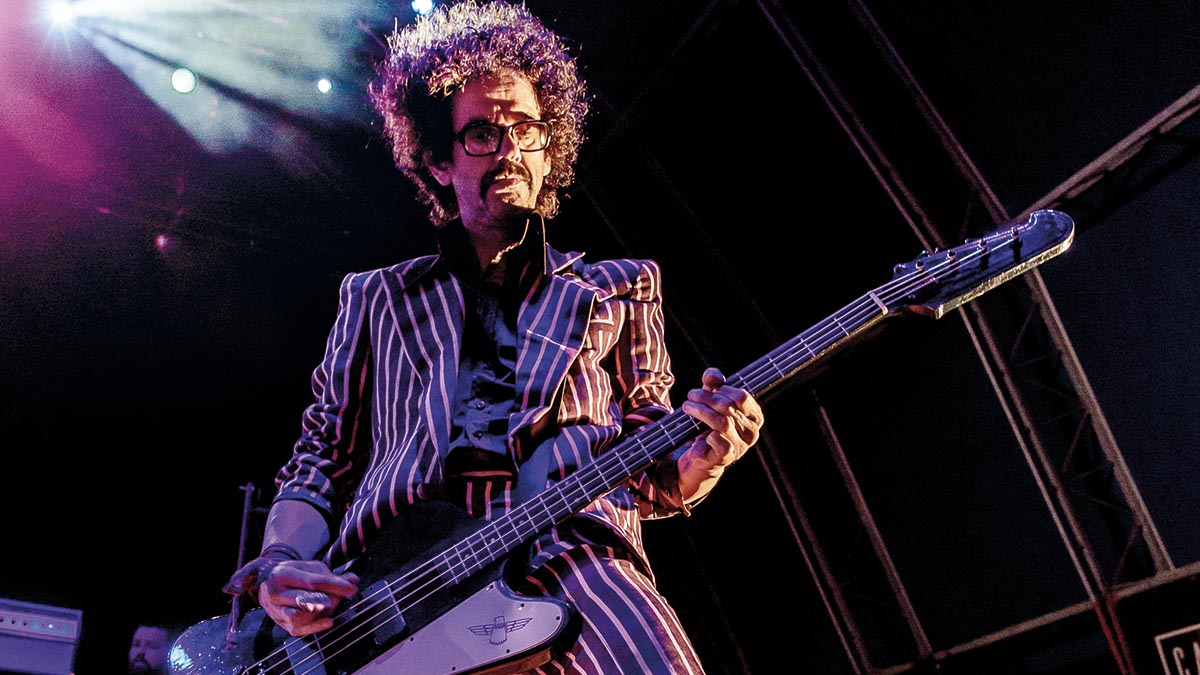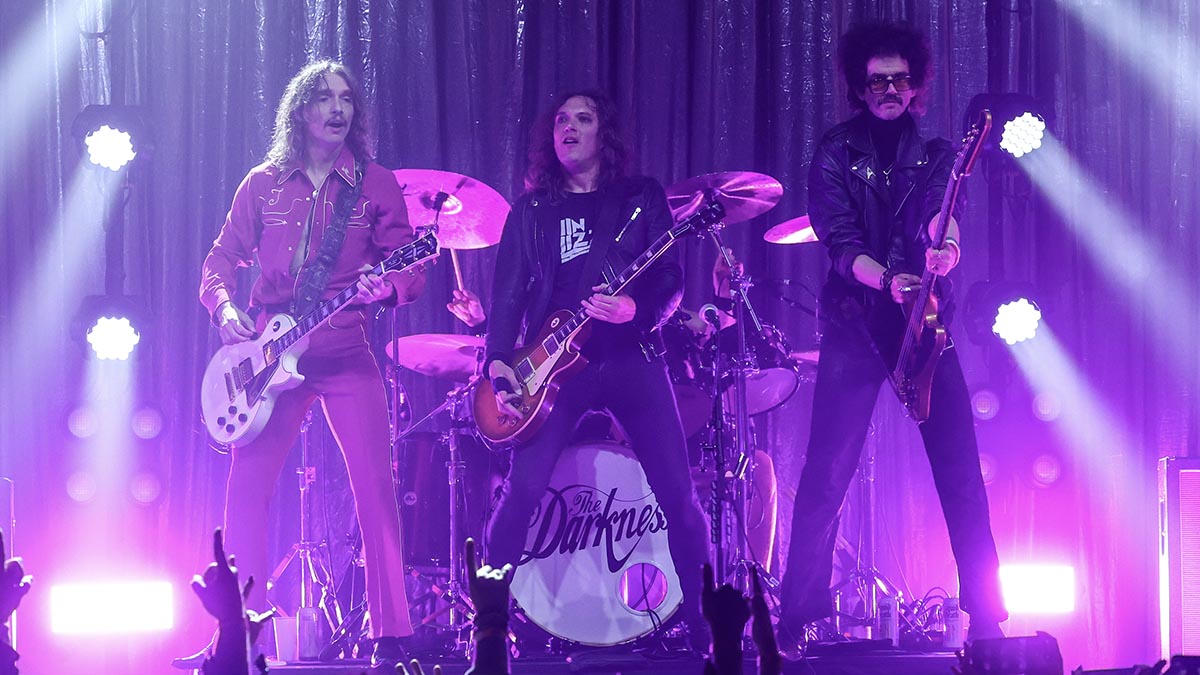The Darkness’s Frankie Poullain: “If you go too posh with distortion, it gets too precise and nice. It’s got to be a bit nasty and a bit wrong”
The world’s last great hard-rock band? The Darkness celebrate 20 years of Permission to Land this year. Bassist Poullain brings the pick and the thumb...

11 albums, 20 years since their debut album, one breakup, three drummers and a frontman with a successful YouTube channel, British rock band The Darkness are no longer a joke, they're a rock institution.
With a robust sense of self-awareness and a serious amount of 21st century rock classics under their belt, the quartet – Justin Hawkins (vocals and guitar), his brother Dan (guitar, also producer), Frankie Poullain (bass) and Rufus Tiger Taylor (drums, and son of Queen’s Roger Taylor) – are now a part of the music landscape, fortunately for us.
We caught up with bassist Frankie on the release of their last album, Motorheart.
Talk to us about the new record, Frankie.
“Well, Motorheart is a hard rock album, whereas the last one [Easter Is Cancelled, 2019] was a bit more thoughtful by our standards, and reflective, and quite emotional really. It was challenging this time in the sense that we weren’t in the same room for a lot of it, but at the same time, it was great in that we really valued the times when we were in the same room.
“At first it was myself, Dan and Rufus, and right towards the end, Justin came in for a few days, which suited him. He’s experienced enough, and has a strong enough sense of identity, that he could record his vocals in Switzerland.
“That makes it sound like it’s the ’80s and we’re a multi-platinum band again, but he happens to have a really nice studio set up there, with views over the Alps. So it seems like necessity is a mother of invention.”
Get The Pick Newsletter
All the latest guitar news, interviews, lessons, reviews, deals and more, direct to your inbox!
You’re a committed Gibson Thunderbird player. Any new bass gear this time?
“Only in that I switched basses to a more modern-sounding Thunderbird. I used a gold 50th anniversary one, which I thought would only be visually different, but when we plugged it in and tested it at Dan’s new studio setup in Sussex, I found that it was actually the best-sounding Thunderbird I’ve played, which I wasn’t expecting. The moral of that story is that sometimes all that glitters is gold.”
Is there a particular song on Motorheart that bass players should listen to?
“I like to think bass players listen to everything, not just bass, but I do like Jussy’s Girl. We toured with Def Leppard, and it has that kind of woozy, warm feeling that you get from Leppard songs. That cosy kind of feeling, that womb-like production that Mutt Lange gave them – you know, that kind of Christmas Day, guilty pleasure kind of sound. Dan really nailed that.”
Welcome Tae Glasgae starts off with a nifty bassline.
“I wouldn’t even call a bassline. I’d just call it a bass pattern, because there’s only one note. I just started doing it, and Dan immediately said, ‘Just keep playing that and don’t move!’ I felt like he was standing behind me with a pistol.”
Did you have to sit in front of a Pro Tools waveform and see how accurate it was, or was it just played by feel?
“That’s a good question, and it’s quite an honest question, so I have to answer it honestly. It was a bit of both, because ultimately, if you get too sucked into the waveforms, you get self-conscious. You have to relax a bit. I do sometimes suffer from red light fever, because I’m a thinker, and one of the worst things you can do as a musician is overthink. It’s one of those situations when you just have to remember not to do that."

“When I first played that part, it was effortless, but of course when you’re in the studio, you know that it’s got to be perfect, and then it’s quite difficult. Also, given that it’s probably going to be the first song we play live, I’m probably gonna be walking on stage and playing it, so I need to get it right.
“So yeah, I did have a few attempts, but actually, there’s more than one bass track there. Dan recorded three tracks and mixed them – one dry, one effected with quite a lot of phase on it, and one with bits of overdrive and ring modulator and all that kind of stuff on it.”
We felt that no-one really talks about Glasgow, even though when you go up there and play at a venue like Barrowland, it’s like nowhere else. There’s a unique atmosphere
Really? It just sounds like a nice fat overdrive to me.
“Well, that’s the goal, you know. The pick helps give it that tone, too. I actually wish I could play that bassline with my fingers, but I don’t know enough about playing with fingers to do it. I imagine it’d be quite difficult to play that part that way.”
If you mess it up, you can always say, ‘That was my jazz moment.’
“Exactly.”
What inspired the song?
“It’s us doing a tongue-in-cheek reference to Welcome to the Jungle by Guns N’ Roses. We felt that no-one really talks about Glasgow, even though when you go up there and play at a venue like Barrowland, it’s like nowhere else. There’s a unique atmosphere.
“Even if you’ve arrived there in miserable, existential darkness and torrential rain and it’s freezing cold, it feels great. The people compensate for the weather: they make it a lovely, warm-hearted place, and they have a keen sense of anarchy, too.”
This album sounds like a real workout for your picking hand: for example, Nobody Can See Me Cry starts with an incredibly fast part.
“It’s a style that Dan has mastered on the guitar. He can do it effortlessly, that kind of machine-gun picking. On a bass it’s tricky, whether or not you match up with the guitars. Sometimes it’s better not to match up exactly, and just leave spaces, otherwise it can sound a bit too mechanical.”
In The Power of the Glory of Love, you do some tight palm-muting, like Cliff Williams of AC/DC.
“I have to say, that was a big struggle, that song. You know, we used to play a lot more like AC/DC on the first album, although I think part of the charm was the fact that we did it with a kind of reckless, irreverent kind of approach to AC/DC rather than being a faithful kind of thing.
“But this time, I decided to use my thumb. I find that the pad of the thumb for muting seemed to be the closest thing. Dan was laughing when I was doing it, because it’s such an old man thing to do. I looked like I should be wearing a bowtie.”
It sounds like you pulled it off pretty effortlessly.
“Well, that’s very generous of you. What I should really do is switch basses, but I’m so married to the Thunderbirds. I have to say, it’s not a good bass for that AC/DC thing. If you’re in a pub-rock band and you’re doing AC/DC covers, you wouldn’t really use a Thunderbird, but I just figured that you don’t want to sound exactly like AC/DC, or what’s the point?”
Have you thought about sticking a bit of sponge under the bridge?
“I have, you know, and I should do that. I should really try different basses and whatnot, but I figured it’s good to keep the band’s identity. If you just do a facsimile of AC/DC, it’s gonna sound lifeless.”
I really like how we’re growing organically. It’s a gradual regrowth and being looked after really well. We have great people working with us
How do you get that big warm overdrive?
“It changes from song to song. In the past, I’ve used a bit of SansAmp. That can be good. And sometimes it’s just the old-fashioned Rat pedal. It’s a bit nasty and edgy. Really, it depends on the song, you know. The Big Muff was the one, back in the day. I sometimes feel that if you go too posh with distortion, it gets too precise and nice. It’s got to be a bit nasty and a bit wrong.”
Live, what do you have in your pedalboard?
“I just have four pedals at the moment. I have an old-school flanger that I only use on a couple of songs. I have the Rat that I mentioned, and a modernized Big Muff, but I don’t use it that often. I also have this wild kind of ring modulator thing that I only actually use for the bridge of the song Easter Is Cancelled, which is probably the most prog thing we’ve done.”
Do you use standard tuning live, or do you go down?
“There’s a lot of drop-D, but I haven’t really gone down to C before.”
You’ll need a five-string for that. It’s only a matter of time.
“I know. We often joke about it. Traditionally, we’ve always been like a ’70s or ’80s kind of band, but on the last couple of albums the ’90s has finally kicked in.”
Does the road have the same appeal as it did when you were younger?
“Even more so, especially now. We’re just itching to go. The last couple of tours went so well. Ticket sales were up across the board in Europe and the UK, so it just feels great.”
What are your longterm goals?
“Just to get back on stage, and keep making the good decisions. I don’t look upon this as a career, and none of us really do. You know, it’s just basically fun. So I see the longterm objective is to keep having fun, and to keep making good decisions with a sense of fun, and not being greedy.
“And not giving in to temptation, which is where I think it all went wrong back in the day. Some of that comes with choosing the people you work with, too. I really like how we’re growing organically. It’s a gradual regrowth and being looked after really well. We have great people working with us.
“We’ve stripped everything back and things just function smoothly. We’ve all become wiser as people and we get on really well – and we have a great laugh together.”
- Motorheart is out now via Cooking Vinyl. The Darkness celebrate 20 years of Permission To Land this year: dates on their website.
Joel McIver was the Editor of Bass Player magazine from 2018 to 2022, having spent six years before that editing Bass Guitar magazine. A journalist with 25 years' experience in the music field, he's also the author of 35 books, a couple of bestsellers among them. He regularly appears on podcasts, radio and TV.
“I asked him to get me four bass strings because I only had a $29 guitar from Sears”: Bootsy Collins is one of the all-time bass greats, but he started out on guitar. Here’s the sole reason why he switched
“I got that bass for $50 off this coke dealer. I don’t know what Jaco did to it, but he totally messed up the insides!” How Cro-Mags’ Harley Flanagan went from buying a Jaco Pastorius bass on the street to fronting one of hardcore’s most influential bands











